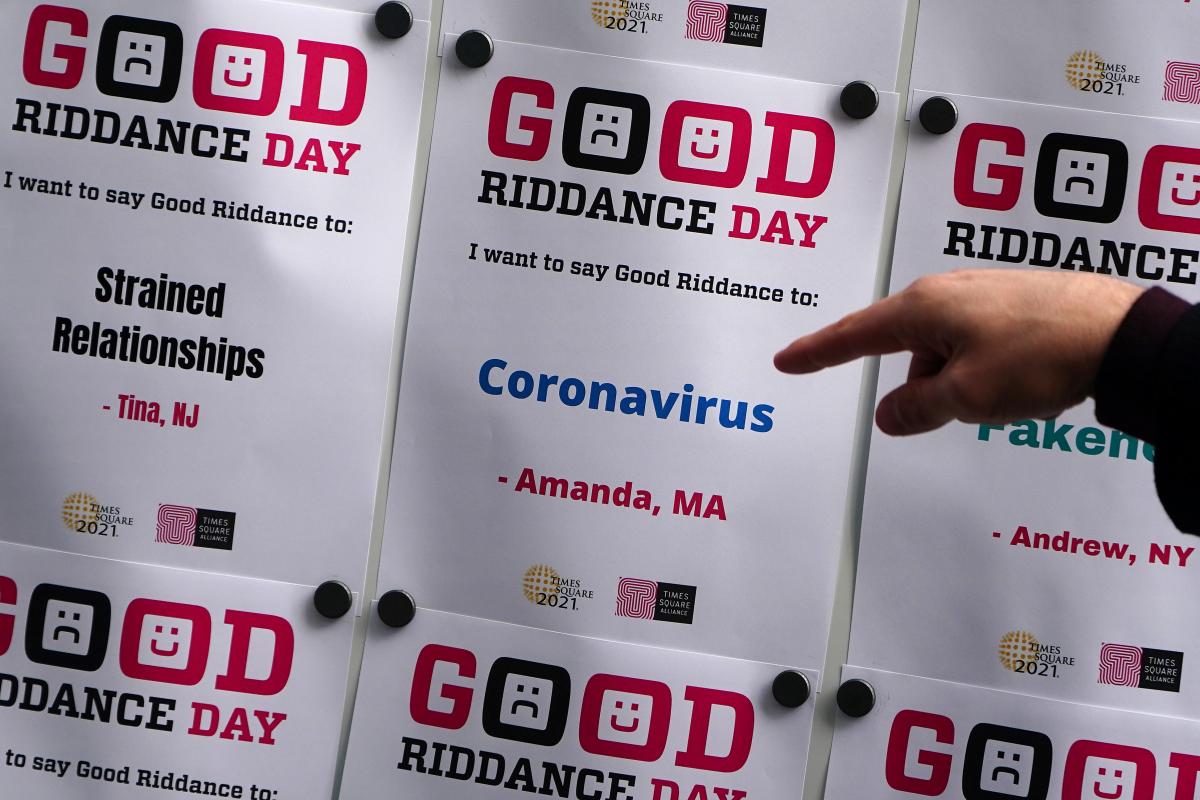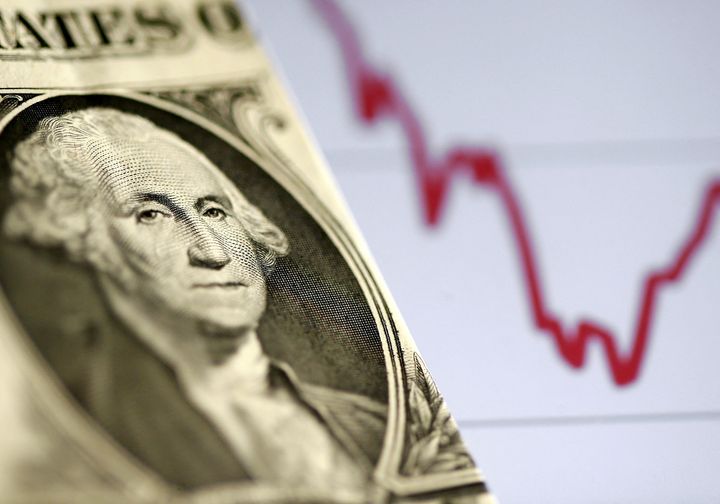Pandemic, TERF, QAnon, 5G and other popular words from 2020

A few minutes every morning is all you need.
Stay up to date on the world's Headlines and Human Stories. It's fun, it's factual, it's fluff-free.
As this year comes to an end, here is a review of some of the most important and frequently used words and phrases of 2020.
There is no contesting that the biggest news story of the year was the COVID-19 pandemic. There were few if any aspects of life that weren’t impacted by the deadly virus and the efforts to contain its spread. With the pandemic, there entered into common vocabulary a host of words and terms like “coronavirus” and “PPE” that, just a year ago, few regular folks used or even knew.
In addition to medical jargon that became commonplace, 2020 saw countless new slang terms gain prominence through a mix of social media and political divisions. To stay informed, you had to understand words like “Antifa,” “TERF” and, of course, “QAnon.” Most of these words weren’t 2020 inventions, but they gained added prominence this year.
As this year comes to an end, here is a review of some of the most important and frequently used words and phrases of 2020. Most will probably still be commonly used in 2021, but only time will tell what next year’s most important word will be. If we’re lucky, it won’t be “pandemic” for the second year in a row.
Antifa: Anti-fascist. “Antifa” can trace its roots back to Italy and Germany in the 1930s, but since at least the early 2000s, the term has been used among leftist activists to express their opposition to far-right politicians and groups.
In 2020, despite being more of an ethos than an organization (according to FBI Director Chris Wray), Antifa became a scapegoat for a variety of transgressions and violent acts.
Asymptomatic: Without symptoms. Though a common medical term, “asymptomatic” entered the daily lexicon for most people in 2020 because of COVID-19. While the virus has numerous symptoms and long-term effects, many people who contract the virus show no outward signs, which is why it was so difficult to contain the virus’s spread.
Be Water: The “Be water” philosophy is attributed to renowned martial artist Bruce Lee, specifically one of his lines from the 1971 TV show “Longstreet.” The philosophy, which encourages one to “empty your mind, be formless,” was taken up by pro-democracy protesters in Hong Kong who resisted the increasingly militaristic response of mainland China to their activism.
Pro-democracy activist Joshua Wong, who has repeatedly been jailed for his efforts, has embraced this philosophy of flexibility in the face of oppression for himself and the movement.
Blexit: Black exit. The Black conservative activist Candace Owens adopted “Blexit” (a take on “Brexit”) to describe her campaign for a mass exodus of Black voters from the Democratic Party. While President Donald Trump increased the share of the vote he received from Black voters in November’s election compared to 2016, it was a relatively minor bump and Black voters were instrumental to securing President-elect Joe Biden’s victory.
Coronavirus: Coronaviruses (so named because of their crown-like appearance) are a variety of viruses, including the common cold, that can infect humans and/or animals. For most people in the world, “coronavirus” was an unknown term before 2020, but it isn’t new. COVID-19 stands for “coronavirus disease, 2019,” because that was the year in which the first case was discovered.
Deadname: The name a transgender person previously used (usually a birth name) before coming out and choosing a new name to go with their gender identity. It is considered in poor taste, even offensive, to refer to a transgender person by their deadname. When the actor Elliott Page came out as a transgender man this year, many media outlets did not refer to his deadname.
Disinformation: The weaponization of misinformation by nations and political rivals to harm adversaries. This year’s presidential election in the United States was again targeted by a Russian disinformation campaign, but Russia was not the only nation to use disinformation. Furthermore, the COVID-19 pandemic proved to be fertile ground for intentionally misleading information.
Juneteenth: June 19 (also known as “Freedom Day” and “Jubilation Day”) is a holiday that recognizes the day the last slaves in the US were officially freed. Though Juneteenth has been celebrated by Black Americans in the US for decades, it is not yet recognized as an official national holiday. This year, amid the Black Lives Matter social justice protests, Juneteenth and its history gained greater attention.
Kraken: A monstrous sea creature (usually depicted as a giant squid or octopus) originally from Scandinavian folklore, though tales of the mythical monster have spread to other regions. The creature has made multiple film appearances in the last decade, including in the 2010 film “Clash of the Titans” and the “Pirates of the Caribbean” film series.
Sydney Powell, a lawyer with a penchant for conspiracy theories who worked on Trump’s election fraud lawsuits, has claimed repeatedly she has evidence that would prove the presidential election was stolen. Powell referred to this never-revealed trove of evidence as the “Kraken,” as it was supposedly going to destroy the Democrats’ alleged efforts to steal the election.
Pandemic: A disease outbreak that occurs across a large geographic area, or the whole world. In March, the World Health Organization declared the COVID-19 outbreak a pandemic. The word was so prevalent in daily life, both Merriam Webster and Dictionary.com made “pandemic” their word of the year.
PPE: Personal Protective Equipment, which consists of gloves, masks, eye and ear protection, respirators, full-body suits, etc. As COVID-19 spread, the need for vast supplies of PPE strained hospitals and nations. The demand for more protective equipment grew so great, the Trump administration relied on the Defense Production Act to require private companies to produce more PPE.
QAnon: Q Anonymous – a pro-Trump conspiracy theory that claims Democrats and celebrities are part of a Satanist child sex trafficking cabal and that a “Deep State” inside the government is fighting Trump. At the center of the movement is an anonymous poster who goes by the name “Q” and is alleged to have top-secret government access, though many suspect Q’s identity is far less impressive.
The first Q posts appeared in 2017, but in 2020, the movement grew substantially with the assistance of social media influencers and well-meaning awareness campaigns.
Example: “QAnon supporters often find secret messages in Trump’s tweets and public messages.”
Republic: A form of government in which citizens of a country determine the laws of their nation by electing officials to represent their will. The United States of America is both a constitutional republic and a representative democracy, though some argue the nation is “a republic, not a democracy.” 2020 was an election year in which the citizens voted for their local and national officials.
TERF: Trans-exclusionary radical feminist – a pejorative term used to describe feminists who deny the gender identity of transgender people. There is a division in liberal feminist spheres between those who say transgender women are women (and transgender men are men) and those who argue a person who is born a biological male can never be a woman. The latter, which includes Harry Potter author J.K. Rowling, are frequently called TERFs.
5G: Fifth-generation mobile technology – the latest upgrade in wireless technology that will allow greater connectivity for increasingly common “smart” technology, or the “internet of things.” The development of 5G technology, which is being led by China, is seen as a major leap forward, but its integration into all aspects of everyday life also raises concerns about security issues.
Conspiracy theorists have erroneously blamed 5G technology for COVID-19, brain cancer and other supposed ills.
Have a tip or story? Get in touch with our reporters at tips@themilsource.com




Comments ()